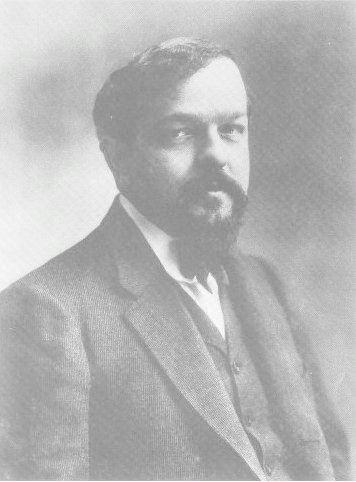![Piano's Solo Corner [Image]](piano8b.gif)
![Piano's Solo Corner [Image]](piano8b.gif)

| Date/Place of Birth: | 22 August, 1862 at St Germain-en-Laye, near Paris. |
| Personality: | A reserved, complicated man who did not like to socialize with people
around him. Debussy hated to appear in public, hated to conduct, hated to play piano at concerts (this is probably
why his music is difficult to understand and is not really appreciated).
Besides that, unlike Schubert's friendly attitude, Debussy was not attractive to his friends and he was very choosy about his friends. This indicated that not all people could be accepted by Debussy as his friends. This was true when Marcel Proust, a French novelist, admired him very much and wanted to know him better, Debussy always ignored him and refused his invitation for dinner. In addition, as a young student, Debussy was a stubborn and rebellious boy. He was always refused what his teachers like César Franck and Ernest Guiraud taught in composition class. No wonder his teachers were irritated by his bad behaviour. Because of his strange behaviour, not many liked him and he had very few close friends; these had made his private life very ambiguous. |
| Piano-Playing Style: | Although Debussy rarely performed in public, his playing style was highly original and new.
The following accounts explained his playing style:
Alfredo Casella, the Italian composer, said,"No words can describe his playing of some of his Préludes. He did not have the
virtuosity, but his touch was extremely sensitive. He used the pedal as nobody else ever did. The result was pure poetry." Therefore, Debussy's approach to piano was totally different from any other composers where he aimed at freeing the piano from its percussive sound. For him, the piano should sound as if it was instrument as if it has no hammers; the fingers should "penetrate the notes"; and the pedal should give the power for the piano to "breath". In conclusion, his piano-playing style -- new fingerings, new spacings, new sonorities, new ways of using pedals, sensitive touch -- was a method of expressing impression on the piano. |
| Music: | Debussy developed new theories of light and color in music. For him, theory came second. What came first was
creating sounds that could stir our emotions. The primitive and medieval music like Javanese music; the canvases and oriental art; the nature like sea,
moonlight, river etc; the colourful places like Spain, Paris, Scotland etc; all these influenced Debussy's music greatly.
Theoretically, Debussy's music is termed as impressionism. The term 'impressionism' was initially used in art to describe the works of Monet, Degas, Whistler, Renoir etc. Their works avoid sharp contours but convey an 'impression' of the scene painted by means of blurred outlines and very thin texture. Therefore, this was applied by Debussy in his music and that was why his harmony was very doubtful -- parallel chordal movement, unresolved dissonances, strange scales, doubtful tonality. And yet the texture of his works was very thin and the sound produced was always very soft and muffled. All these were very similar to the characteristics of the impressionistic paintings. In conclusion, it is very important that to understand Debussy's music, one has to listen it very carefully and feel the impression of an object being conveyed in the music. In other word, one should not merely look at an object plainly but to feel it abstractly. |
| Composing Habit: | In Debussy's works, color, timbre and rhythm were considered as similar as the harmony and melody. In terms of color and timbre, Debussy often
put French terms of performance directions (like En animant, doux et expressif etc) here and there throughout the piece as if he was painting a picture. And yet his dynamic
level applied was very wide ranging from ff to ppp. But he used to add very soft dynamic to show an impression.
Besides that, he always added irregular groups of notes and doubtful harmony that made the music blur and penetrating with the help of the sustaining pedal. This was explained by Debussy's fellow student described his works as 'a regular unresolved chords, unfamiliar arpeggios and indescribable harmonies'. Lastly, while Debussy was composing, instead of using classical forms and tonality style, he used ancient devices - oriental pentatonic scale, whole-tone scale, Gregorian melody. His music was therefore very exotic. |
| Debussy's Quote: | "There is no theory. You have only to listen. Fantasy is the law." Debussy in conversation with his composition teacher, Ernest Guiraud Their conservatoire is the eternal rhythm of the sea, the wind among leaves and the thousand sounds of nature." "What I am trying to do is something different - an effect of reality, but what some fools call impressionism, a term that is usually misapplied, especially by the critics..." |
| Debussy's Death: | Depressed by the World War I and troubled by severe cancer, Debussy finally passed away on 25 March, 1918 in Paris. |